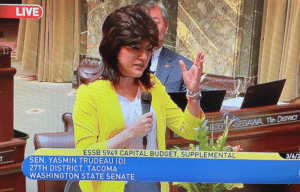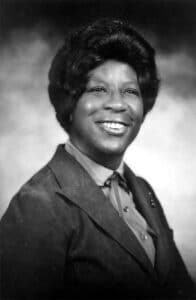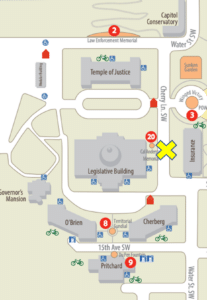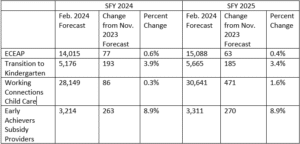 An early morning photo taken from the spot of Washington’s original Territorial Capitol
An early morning photo taken from the spot of Washington’s original Territorial Capitol
(Photo Credit: Erica Hallock)
Note to the reader: With the conclusion of the 2024 legislative session, this represents our final weekly edition of Notes from Olympia for the year. We plan to send out updates periodically throughout the interim. In the meantime, keep your eyes out for a survey – we are eager for your feedback and are always on the lookout for trivia suggestions. Thanks for reading!
Trivia!
License Plates. How many options do Washingtonians currently have to choose from for special design license plates?
- Bonus Trivia: Had SHB 2489 passed, Washingtonians would have had another choice for a special design license plate. Which beloved icon would this new special license plate option have featured?
This Week’s Highlights
The Legislature adjourned Sine Die with its traditional fanfare March 7. The Legislature spent its last week passing three Initiatives to the Legislature, taking final votes on scores of bills, saying goodbye to colleagues, and passing Supplemental Capital, Operating and Transportation budgets.
Initiatives to the Legislature. As expected, the Senate and House passed three of the six Initiatives to the Legislature: I-2113 (vehicular pursuits), I-2081 (parental rights) and I-2111 (income tax). This means that these three initiatives will not appear on the November ballot.
The two bodies’ approaches to the debates and votes on the initiatives captured the tenor of the session; the Senate moved efficiently, debating and voting on all three in under an hour and the House took over an hour to debate just one of the three initiatives. For further details, we will continue to recommend the Washington State Standard coverage.
Since there was no action taken on the other three Initiatives to the Legislature, they will appear on the November General Election ballot for consideration and decision by the state’s voters:
- I-2109: Repeal of the Capital Gains Tax
- I-2117: Repeal of the Climate Commitment Act
- I-2124: Opt-out option for Washington’s long-term care program Long-Term Care
If you would like more information about the initiative process, it was featured in our Jan. 19 edition of Notes From Olympia.
Bills, Bills, Bills. Last week we explained that when a bill is amended in the opposite chamber it must return to its originating chamber for “concurrence” in the amendments made in the opposite chamber. Early in the week, the Senate and the House spent time voting to concur in amendments made in the other body. This is a quick, but important step for a bill to take on its way to the Governor’s desk.
One important bill to note is ESSB 6038, clarifying tax exemptions for child care services. Deemed “Necessary to Implement the Budget,” it was not subject to legislative deadlines. Before approving the bill 95-1 Tuesday, the House adopted a Floor amendment that removed the provision prohibiting DCYF from charging licensing fees. With that change, the bill serves to expand the business and occupation tax exemption for child care services for children up to age 7 to children up to age 12 and children up to age 18 who have a verified special need or are under court supervision. Perhaps there will be another effort in 2025 to eliminate child care licensing fees. The Senate then concurred in the House amendments to ESSB 6038 March 6.
Check out Start Early Washington’s bill tracker on our state policy resources page for a look at which bills made it to the end of the process. Not surprisingly, the list of bills that did not make it is much longer than those that did!
Cliffhanger revealed – 5 p.m. bills. Last Friday’s Opposite House Cutoff 5 p.m. bills were meaty, and each brought a level of drama. The Senate took up ESHB 1589 relating to clean energy. This bill had been brought up for debate a day earlier but was ruled unconstitutional by the Lt. Governor after a Republican objection. Overnight, the bill was re-worked to address the issue and after consideration of many, many amendments, the bill passed. ESHB 1589 experienced further drama when it returned to the House for concurrence in Senate amendments Monday, March 5. After five hours in caucus, the House finally concurred in the Senate amendments in the wee hours of March 6, adjourning just after 2 a.m.
Over in the House, the 5 p.m. bill was ESB 5241, the Keep Our Care Act. After announcing ESB 5241 would be the final bill for the evening, the House broke for caucus meetings and did not return to the Floor, so the bill did not advance.
Budgets
On Wednesday, Start Early Washington updated its state budget comparison chart to reflect the conference proposals for the Operating, Capital and Transportation budgets on our state policy resources page.
As one of the final actions before adjourning Sine Die, the Legislature voted to approve each of the budgets. On March 6, the Senate and House each unanimously approved the Capital budget and, as demonstrated by the picture below, with a bit of “fanfare” in the Senate. The Operating and Transportation budgets were each approved on the final day of session – March 7.
The budget is a bill and, like every other bill, does not go into effect until signed by the Governor. It is important to track to see if the Governor issues any vetoes on aspects of the various budgets.
 Prior to voting in favor of the Capital budget, many Senators donned mullets in honor of Senator Mark Mullet, who oversaw the crafting of the Capital budget.
Prior to voting in favor of the Capital budget, many Senators donned mullets in honor of Senator Mark Mullet, who oversaw the crafting of the Capital budget.
(Photo Credit: TVW screenshot)
In Memoriam
With heavy hearts, we want to honor Former Representative Peggy Maxie and acknowledge her passing on Feb. 18. We have included some information about her amazing life and accomplishments below, but if you would like to learn more about her career, we featured a more thorough overview in our Feb. 4, 2022 edition of Notes From Olympia.
Born in 1936, Representative Maxie was the first Black woman elected to the Legislature in 1970 and she served until 1983, for a total of six terms. She and her family came to Washington state in 1942 when her mother was hired by Boeing as part of the World War II workforce. After she graduated from high school, Maxie worked for the Attorney General’s office and for the Seattle Urban League. She then earned her bachelor’s degree in psychology from Seattle University and her Master of Social Work from the University of Washington. In addition to working as a consultant for health and community programs, she also trained for nine months to become a nun.
The story is that Representative Maxie had a somewhat comical entry into the political sphere. Her brother, Fred Maxie, had decided to run for Position 2 in the 37th District but changed his mind to go to law school. He’d already had campaign signs with their last name—Maxie—printed on them and didn’t want them to go to waste. It turned into a real-life example of the sunk cost fallacy, as he asked his sister to step up and run instead. Their other brother, Robert, had already forayed into the world of politics and had worked for years in the Democratic Party. Through providing organizational and financial support, he helped launch his sister’s political career, as she would soon become Representative Maxie. He even recruited Jim McGill, a professor of English at Seattle University, to be her campaign manager.
 Peggy Maxie and one of her campaign posters
Peggy Maxie and one of her campaign posters
(Photo Credit: Seattle Times)
In Representative Maxie’s decade-plus tenure, she served on the House Appropriations, Judicial, Rules and Insurance Committees. She worked on notable legislation including the Landlord-Tenant Act and the Displaced Homemakers Act. The first act was responsible for defining the relationship between landlords and tenants and established some of the first tenant protections in our state. The bill faced active opposition from landlord lobbyists, but still passed. (Interestingly, the same Landlord-Tenant Act was a major issue during this 2024 session, with landlord lobbyists strongly opposing rent stabilization efforts). The second act supported women who had been “displaced due to divorce, death of a spouse, disability of a spouse, or other loss of family income of a spouse,” according to HistoryLink.
 Peggy Maxie
Peggy Maxie
(Photo Credit: Women in the Legislature)
We will be forever grateful for Representative Maxie’s contributions to civil rights, education and housing in the state. Her legacy has impacted so many—it extended beyond her time in the Legislature and will extend beyond her lifetime.

 What could have been … A sample Smokey the Bear license plate
What could have been … A sample Smokey the Bear license plate The first light of the day greets the Capitol Building for more legislative activity
The first light of the day greets the Capitol Building for more legislative activity “X” Marks the Spot of the Original Capitol Building for the Washington Territory
“X” Marks the Spot of the Original Capitol Building for the Washington Territory The original Capitol Building in the snow (1911)
The original Capitol Building in the snow (1911) The Legislative Building awaits another busy week
The Legislative Building awaits another busy week Potato Day!
Potato Day!

 One of the sixth grade lobbyist posters in support of the Pacific razor clam
One of the sixth grade lobbyist posters in support of the Pacific razor clam